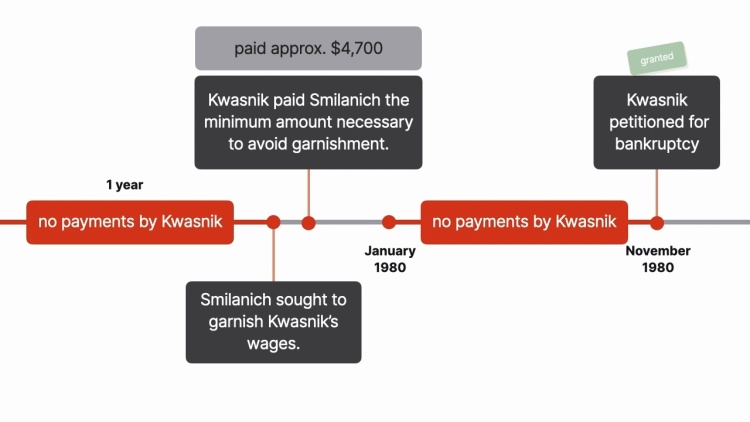Kwasnik v. State Bar of California
California Supreme Court
50 Cal. 3d 1061, 269 Cal. Rptr. 749, 791 P.2d 319 (1990)
- Written by Abby Roughton, JD
Facts
In 1970, New York attorney Richard Kwasnik (plaintiff) was involved in a drunk-driving accident that killed Steven Smilanich. Smilanich’s survivors brought a wrongful-death action against Kwasnik and received a $232,234.16 judgment. However, Kwasnik paid nothing on the judgment until 1975, when a court garnished Kwasnik’s wages. Between 1975 and 1980, Kwasnik paid the Smilaniches a total of $4,649, even though Kwasnik was earning a salary, living rent-free with his mother, and putting his wife through college. In 1980, Kwasnik stopped paying, unsuccessfully tried to settle with the Smilaniches for $15,000, and ultimately filed for bankruptcy to discharge the judgment. In 1980 and 1986, the Florida state bar found that Kwasnik did not meet the moral-character requirement for bar admission based on the Smilanich matter, but the state supreme court disagreed and allowed Kwasnik to be admitted. In July of 1987, Kwasnik passed the California bar exam, and the state bar (defendant) conducted a moral-character investigation. Kwasnik submitted 15 letters attesting to his good character from lawyers, judges, and a pastor. Kwasnik also submitted evidence that he had never been involved in attorney disciplinary proceedings in New York, that he had diligently trained younger New York attorneys, and that he had served competently as trustee of a $400,000 trust. A hearing panel recommended Kwasnik’s admission, but the Review Department of the State Bar Court disagreed, noting, among other things, that Kwasnik only paid the Smilanich judgment once his wages were garnished, had not contacted Smilanich’s survivors or made further payments to them since 1980 despite having considerable means, and had failed to accept any responsibility for what happened to the Smilanich family. The review department thus recommended that Kwasnik be denied admission. Kwasnik sought review in the California Supreme Court.
Rule of Law
Issue
Holding and Reasoning (Per curiam)
What to do next…
Here's why 907,000 law students have relied on our case briefs:
- Written by law professors and practitioners, not other law students. 47,100 briefs, keyed to 996 casebooks. Top-notch customer support.
- The right amount of information, includes the facts, issues, rule of law, holding and reasoning, and any concurrences and dissents.
- Access in your classes, works on your mobile and tablet. Massive library of related video lessons and high quality multiple-choice questions.
- Easy to use, uniform format for every case brief. Written in plain English, not in legalese. Our briefs summarize and simplify; they don’t just repeat the court’s language.





